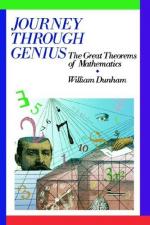
|
| Name: _________________________ | Period: ___________________ |
This quiz consists of 5 multiple choice and 5 short answer questions through Euclid and the Infinitude of Primes.
Multiple Choice Questions
1. What did Hippocrates do that advanced mathematical methods?
(a) He demonstrated that geometry does not have to be based on previous knowledge.
(b) He proved that mathematics can be applied in a unlogical order.
(c) He created a new ways to disprove theories.
(d) He built theorems based on sequencially more complex proofs.
2. What is true about prime numbers?
(a) That for every group of prime numbers, there exists at least one more prime.
(b) Prime numbers are not divisible by other numbers.
(c) Prime numbers can not exist in a finite series.
(d) Prime numbers can never be an odd number.
3. What does the Pythagorean Theorem state?
(a) For any right triangle the square of the diagonal side is equal to the sum of the squares of the two legs.
(b) For any right triangle the diagonal side is equal to the sum of the legs.
(c) For any triangle the sqaured sum of the legs is equal to half the hypotenuse.
(d) For any triangle the sum of the legs squared is equal to the length of the hypotenuse.
4. Which of the following was NOT one of the basic definitions in Elements?
(a) Right angles.
(b) Line.
(c) Parabola.
(d) Straight Line.
5. Which of the following was NOT one of Gauss' discoveries?
(a) "Non-euclidean" geometry.
(b) That angles in a triangles can not add up to more than 180 degrees.
(c) That there is no apparent contraction to the assumption that the sum of angles in a triangle can have fewer than 180 degrees.
(d) That under Euclid's definition parallel lines can intersect.
Short Answer Questions
1. What did Dunham consider extraordinary about the Elements?
2. What name did Euclid give for numbers that could be divided by numbers other than themselves and one?
3. Which of the following could NOT be included as a step in Euclid's great theorem?
4. Which of the following is an example of a perfect number?
5. What shape was NOT demonstrated in the Elements as having a relationship to other shapes?
|
This section contains 398 words (approx. 2 pages at 300 words per page) |

|




